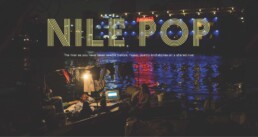Bridging Humanities is an open access, peer reviewed, interdisciplinary and multi-area platform, that allows a working place to publish digital projects in innovative formats.
Bridging Humanities includes original research from the Humanities intended as an open field that is connected with other disciplines in co-creation with others.
Nile Pop
Music, poetry and stories on a shared river
In 1999, countries in the Nile Basin designated 22 February as Nile Day: a day to celebrate their cooperation in the Nile Basin Initative.
This special issue of Bridging Humanities, titled Nile Pop, features multimedia material (texts, podcasts, music, video) that were presented in February 2020 in the evocative setting of the Egyptian Taffeh Temple during a symposium on the Nile river in popular culture in Ethiopia, Sudan and Egypt at the Rijksmuseum van Oudheden in Leiden.
Ethiopian and Egyptian researchers, together with Sudanese musicians, showed how the Nile has inspired music, poetry, and cinema. The event further highlighted how such art forms spark emotions that shape our understanding of the river and its infrastructure.

Reframing PJU
Reframing PJU, an open ended artistic research project by Andrea Stultiens. In this project she works with an extensive collection of photographs produced on the African continent by Dr. Paul Julien (NL, 1901-2001). A selection of these photographs were frequently used in Dutch media from the 1930s onward and as such his works contributed much to imagination of ‘Africa’ in The Netherlands. Julien’s archive is now in the care of the Nederlands Fotomuseum and stored under the three-letter code PJU.
In Stultiens hands, singular photographs become part of, literally, expanded frames that establish connections with the other pictures and narratives that they relate to in and through time. She calls them Breathing Photographs. By opening up the frame, through sharing the photographs with others and incorporating input from outside, Stultiens decentralises Julien as main figure in the photographic encounter.
Digital humanities - The African Perspective
What specific developments in the field of Digital Humanities are taking shape in Africa? What is their potential to enhance the global DH agenda? Bridging Humanities facilitated this discussion during a workshop at the Lorentz centre before the international Digital Humanities conference in Utrecht this year. This film highlights discussions of the workshop, at which around 20 African DH scholars from various disciplines gathered to build capacity and discuss ideas for joint projects. The website contains reflections on the workshop and the ideas for joint projects, and will be developed into a special issue based around the question whether the digital brings continuity or change for African research.
Dissenting Voices - Challenging the colonial system
Can collaboration between academia, journalism and the arts lead to new perspectives on the Dutch colonial past? In this Bridging Humanities publication historian Maartje Janse, research journalist Anne-Lot Hoek, musician Ernst Jansz cooperated with Bridging Humanities/Voice4Thought, to explore how critical thinking regarding the colonial context in the Dutch East Indies (current Indonesia) has evolved by analyzing various ‘forgotten’ voices of protest. The authors question mainstream historical narratives and argue for an anti-colonial tradition of protest. The publication includes artistic contributions and suggests ways forward for research, also in relation to Dutch state-sponsered project ‘Independence, decolonization, violence and war, Indonesia 1945-1950’ that is carried out by the KITLV/Royal Netherlands Institute of Southeast Asian and Caribbean Studies, NIOD Institute for War, Holocaust and Genocide Studies, and the Nederlands Instituut voor Militaire Historie.
Croquemort: A biographical journey in the context of Chad
What can the life of Didier Lalaye, a medical doctor, also known as slam artist Croquemort learn us about the possibilities of ICT and social media for youth and artists that cope with oppression in Chad? Mirjam de Bruijn collaborated with Didier Lalaye and filmmaker Sjoerd de Bruijn for this first multimodal publication of Bridging Humanities. Next to a video pamplet that is shown here, the publication contains a wide range of digital sources that enrich the biographical method. Mirjam argues for academic researchers to adopt a nomadic mind that embraces serendipity – the art of understanding the unpredictable and amazing moments as much as the ordinary. In the process of co-creation, existing knowledge hierarchies are challenged.
